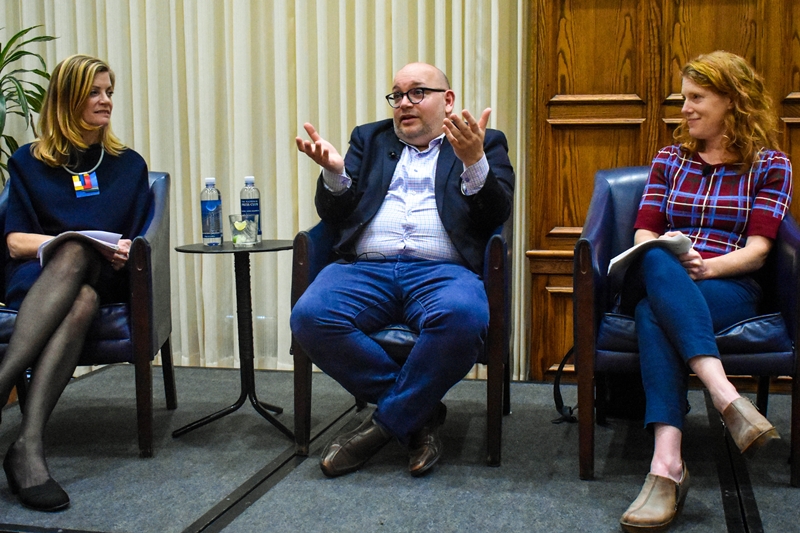Rezaian describes making his '544 Days' podcast during panel
After arriving home in the United States after almost two years in an Iranian prison, Jason Rezaian faced a question: How exactly would he talk about his time in detention?

The Washington Post journalist first wrote a memoir. Then he decided to embark on a much different approach: the podcast, which has exploded in popularity for its rich storytelling, its lyrical pacing and tension, and its breadth of voices all woven together to inform and engage listeners.
The result, the nine-part podcast series “544 Days,” is a revealing, darkly funny story that validates the choice of medium, Rezaian told an audience during a live-panel discussion at the National Press Club Wednesday evening, March 16.
Rezaian discussed the making of the podcast with other characters featured in the series: his mother, Mary Rezaian; William McCarren, Press Club executive director; and Alison MacAdam, a Peabody Award-winning former National Public Radio journalist.
“For me, it was really important to be true to the experience,” Jason Rezaian said of the decision to inject levity and humor into a tale involving political negotiations, solitary confinement and interrogations.
Early on in his confinement, Jason Rezaian told himself he had to focus on the almost comic level of absurdity of his situation. “Look, if you can’t find things to laugh about, you’re in big trouble,” he said he told himself.
The characters in the series all played a role in ultimately bringing Jason home.
Mary Rezaian described her trip to Iran to lobby for her son’s release five months after he was captured. She eschewed advice to cry and plead with Iranian officials, instead assuming the role of the stern mother she gleaned from Turkish soap operas. She gave them “the look,” pounding on the table, told them she would hold them directly accountable if anything happened to her son, she said.
“I wasn’t playing the part they expected me to play,” Mary Rezaian said. “It was very effective and it was intentional.”
McCarren, working with Jason Rezaian’s older brother, Ali, pledged to leverage the Club’s resources to publicize his case.
“Jason’s case was the first case where we just loaded up and put everything out,” McCarren said. The campaign “informed us what we could do in future cases.”
There are 488 journalists and media workers in detention and another 65 journalists held hostage, according to Reporters Without Borders. The “erosion of democracy all around the world right now” is partly to blame, McCarren said.
MacAdam said the narrative, which stitched together perspectives from government offices, the Washington Post newsroom, and Jason’s family, was hatched from a whiteboard of sticky notes in her dining room in February 2020.
Jason Rezaian and the podcast producers, working remotely during the COVID-19 pandemic, recreated the narrative by interviewing people like former Secretary of State John Kerry and former Washington Post editor Marty Baron. Jason Rezaian also interviewed his wife, Yeganeh Salehi, sitting on their couch at home.
Starting with Jason’s capture, “it just grows bigger and bigger, and more and more people become involved, and more and more strands begin to work toward his release,” MacAdam said.
Ultimately, the series, which was released in September and soared high on the Spotify podcast charts, provides a roadmap for people looking to help other journalists that have been unjustly imprisoned around the world, Jason Rezaian said.
“It’s not in a hostage’s interest to keep their story quiet,” Jason Rezaian said.
Full audio of the event below:
